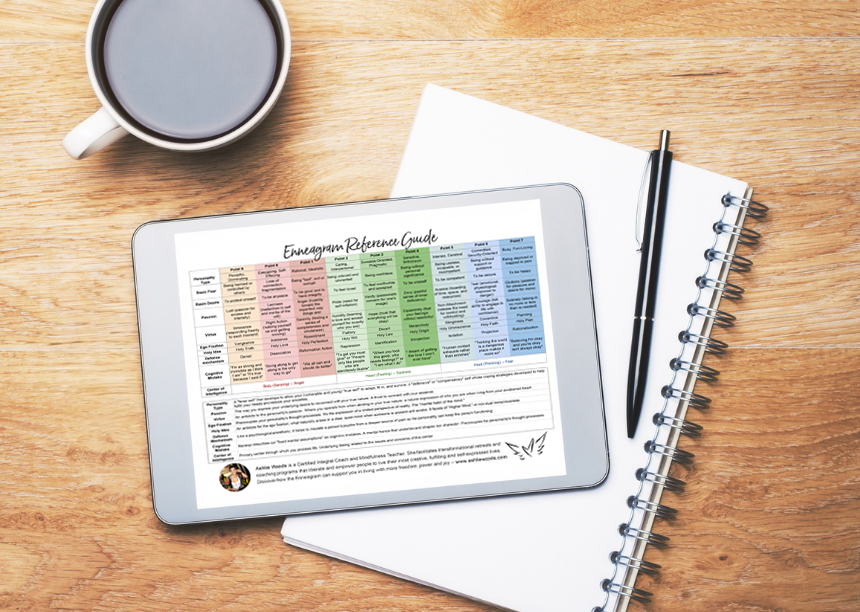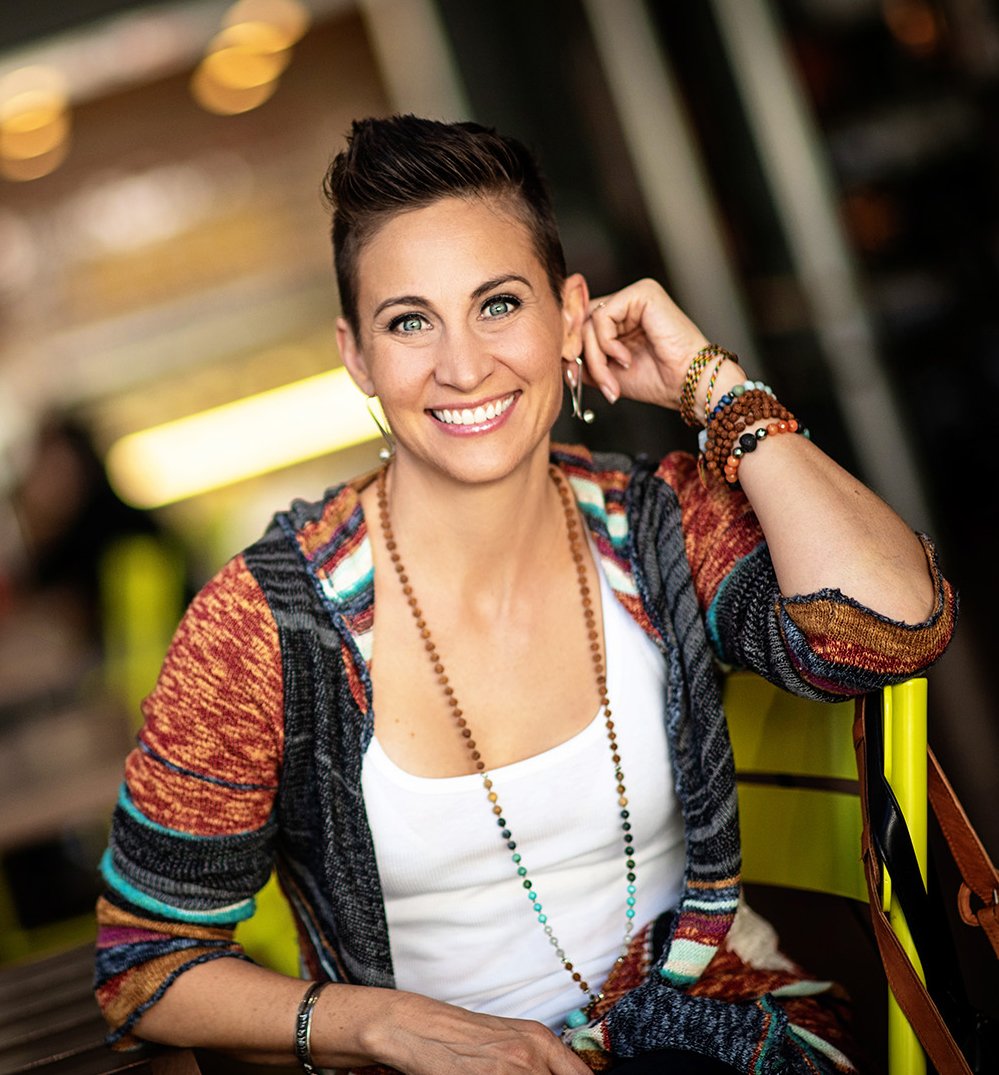Social Eight — "Solidarity" (Countertype)
The Social Eight is the countertype of the three Eight subtypes. Social Eights represent a contradiction: the Eight archetype rebels against social norms, but the Social Eight is also oriented toward protection and loyalty. They express lust and aggression in the service of life and other people.
This person is "social antisocial." In contrast to Self-Preservation Eights, Social Eights are more loyal, more overtly friendly, and less aggressive. They are helpful Eights-people who are nurturing, protective, and concerned with the injustices that happen to people-yet they also display an antisocial aspect with regard to the rules of society.
This quick reference guide captures the various aspects of each Enneagram Type including attributes, basic fears, desires, passions, virtues, fixations, defense mechanisms, and more!
Naranjo explains that, symbolically, this character represents the child who became tough (or violent) in protecting his mother against his father. This is someone who bands together with the mother and goes against the patriarchal power and all that is associated with it: violence out of solidarity. Archetypally, this character represents the child who has given up on getting love from the father and allied with the mother against him.
Social Eights are very sensitive to detecting situations in which people are being persecuted or exploited by others that hold more power. When they detect this kind of thing, they tend to act to protect those who are less powerful. Karl Marx, the champion of worker solidarity and outspoken critic of capitalism, may have been a Social Eight.
Overall, this Eight appears more mellow and outgoing and less quick to anger than the other Eights. They tend to rebel in less obvious was. They are very active, and they may lose themselves through constantly being in action. The may display a disproportionate lust for projects or for collecting things.
Socially, Social Eights like the power a group offers, and they may have difficulty engaging in more "individualized" relationships. In extreme cases, this Eight can tend toward megalomania. In close relationships, they may display a lack of commitment to the partner that hides an unconscious fear of abandonment.
In becoming a protector at too young an age, these Eights typically lose consciousness of their own needs for love and care. While people with this Eight subtype develop a strong ability to care for and protect others, they unconsciously give up their own need for love and replace it with a compensatory movement toward power and pleasure. It's generally hard for an Eight to make their love needs conscious, and while they can seem softer or calmer than the other Eights, Social Eights also have a blind spot where their own needs for love and protection are concerned.
This Eight often doesn't look like an Eight, Ichazo called this subtype "Friendship," but Naranjo uses the descriptor "complicity" or "solidarity" to distinguish the everyday, positive meaning of the word "friendship" from what he calls the "ego game" of the Social Eight’s unconscious personality pattern. According to Naranjo, this individual’s main drive is for something like loyalty. The Social Eight subtype is the most intellectual of the three, but these Eights also rebel against the dominant (patriarchal) culture. This rebellion necessarily involves a mixture of authority and intellect because the dominant authority in patriarchal societies tends to promote the intellectual control of impulses and excess. While the Sexual Eight is the most overtly anti-intellectual of the three Eight subtypes, the Social Eight goes up against the power of authority out of a desire to protect the oppressed and, unconsciously, a personal need for the nurturance associated with maternal care.
Male Social Eights can look like Type Nines, and female Social Eights may resemble Type Twos. However, these Eights can be distinguished from Nine and Twos because they act in more direct, powerful ways, engage more readily in conflict, and express more power and control in seeking to protect and support other people.
Annie, a Social Eight, speaks:
I am always doing something for other people and thinking that as soon as this current activity is finished then I'll turn to what I want to do just for me. When I first encountered the Enneagram I thought I was a Two because I didn't identify with the anger or the need to dominate. I was phobic of anger and unaware of my own underlying aggression. I wasn't aware of how controlling my efforts to help felt to others, and I would be hurt when people pushed back and complained.
I frequently get pulled into the leadership role in groups and then get whacked for thinking I know what's best to accomplish the task or project. In high school, to avoid this kind of pain, I started saying, "I’m not a leader. Don’t look at me to get this done." It didn't work. When I see something that needs doing, especially if it benefits others, I step in and get it done.
I have always been seen as friendly and yet have not had "best" friends that I was vulnerable with until late in life. It is hard to admit that I need help or concern or comfort. While I care about people and do a lot for them, I am realizing that I don't allow myself to have them matter that much to me. I have often left relationships without a look back. Until recently, I have not been the one who maintain friendships. I both yearn for the closeness friendship provides and feel scared of it-partly because I then feel obligated to take care of the other person no matter what.
I have been frequently hurt and puzzled by other people's reactions to me, and I work consciously to avoid being experienced as "too much" or intrusive. When others experience me this way, I often feel misunderstood. Because of this dynamic, I feel like I have to monitor my energy and impact so others can be comfortable. But I like the amount of energy and drive and decisiveness I naturally have. It is easy for me to start in a certain direction without too much planning and then make a course correction if needed. I have always been physically active, participating in both team and individual sports.
Fortunately, I was guided toward becoming a psychotherapist. In that role I have had a lot of practice with leading back to hear the other's experience, mirroring their truth back to theme, and offering help with an open hand. I feel my openheartedness, but it's more difficult to receive the love and gratitude others have for me. Most importantly, I've learned to trust that each person has their own wisdom and ability to live their life well.
Specific Work For The Social Eight on the Path from Vice to Virtue
Social Eights can travel the path from lust to innocence by learning how to take care of themselves in the same ways they feel moved to take care of others. Social Eights focus on protecting and supporting others as a way of acting out their own denied needs for protection and support, so it's important for them to embody innocence by being more actively and regularly aware of their own inner child and its needs for love and safety. These Eights grow in direct proportion to the degree to which they can see how they displace their need for love and support into taking action to be powerful in the world. It may be important for them to actually think about themselves as innocent children, as we all understand that all children deserve love, care, and protection-and that all children are naturally innocent. Opening up to the innocence involved in allowing themselves to be loved, taken care of, and vulnerable-which may have been impossible when they were young-allows Social Eights to reintegrate the child inside them that they had to abandon when they needed to get big fast in order to deal with the world.
Sourced with permission from The Complete Enneagram by Beatrice Chestnut.
Type 1 Type 2 Type 3 Type 4 Type 5 Type 6 Type 7 Type 8 Type 9
Ashlie Woods
Director of Business Division & Lead Coach at Sourced
Ashlie is a transformational coach, retreat leader, dance lover and Enneagram enthusiast. She is passionate about facilitating experiences that liberate and empower people to live their fullest, more creative and self-expressed lives. She believes there is a life that wants to be lived through you and a purpose only you can fulfill.
She spent 6 years designing and delivering corporate training programs focused on leadership development and company culture before making the bold leap to start her own retreat-based business.
Ashlie now supports heart-centered business owners (coaches, consultants, creatives, healers) to market, sell and deliver their transformational work in the world using their unique magical gifts.




